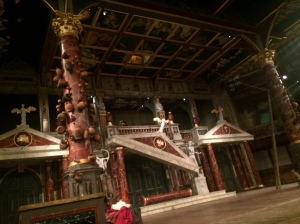There were so many great pieces of art at the British museum and I was particularly blown away by the Ancient Egyptian exhibits. However, the Grecian Urn exhibit was of particular interest to me.
I spent a great deal of time in the Grecian Urn exhibits with “Ode on a Grecian Urn” by Keats in mind. For anyone interested in reading the poem, here is a link to a website that discusses the poem and displays a copy: http://englishhistory.net/keats/poetry/odeonagrecianurn.html
I began searching for urns that might inspire me, and found several. I captured two of my favorites:
I think what is most intriguing about these urns is that each tells its own story –it’s no wonder Keats was so inspired.















